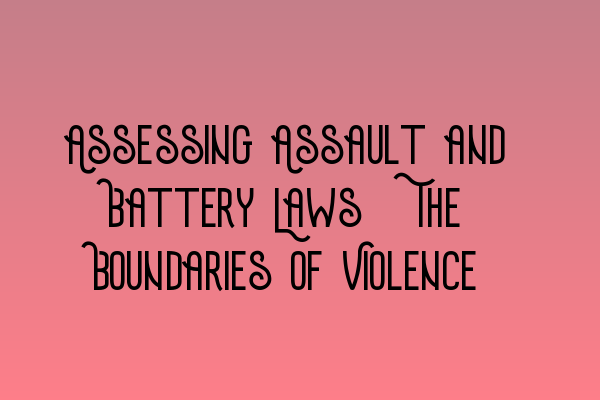Assessing Assault and Battery Laws: The Boundaries of Violence
When it comes to criminal law, assault and battery are two terms that are often used interchangeably. However, they have distinct legal definitions and consequences. Understanding the boundaries of violence is crucial in ensuring justice is served and victims’ rights are protected.
Assault, as defined under the Criminal Justice Act 1988, refers to the intentional or reckless act of causing another person to apprehend immediate and unlawful violence. This means that physical contact is not necessary for an assault to occur. The victim only needs to believe that violence is about to happen.
Battery, on the other hand, involves the intentional and unlawful application of force onto another person. Unlike assault, battery requires actual physical contact. It can vary in severity, from a simple push or slap to a more serious act causing significant bodily harm.
It is essential for both legal professionals and the general public to have a clear understanding of assault and battery laws. This knowledge enables individuals to protect themselves, identify potential criminal actions, and seek appropriate legal recourse.
The Elements of Assault and Battery
Assault and battery cases are evaluated based on specific elements that must be proven to establish guilt. Let’s delve into the key elements of each offense:
Assault:
- Intention or recklessness: The perpetrator must have intended to cause the victim to apprehend immediate and unlawful violence or acted recklessly, which resulted in the victim’s apprehension of such violence.
- Apprehension of violence: The victim must have reasonably believed that violence was about to occur.
Battery:
- Application of force: The perpetrator must have intentionally applied physical force onto the victim.
- Unlawfulness: The act of applying force must be without lawful justification or excuse.
Punishments for Assault and Battery
The penalties for assault and battery vary depending on the severity of the offense and the circumstances surrounding it. In the UK, assault and battery offenses fall under different categories:
- Common Assault: This offense carries a maximum sentence of 6 months imprisonment or a fine, or both.
- Actual Bodily Harm (ABH): ABH involves more serious physical harm and carries a maximum sentence of 5 years imprisonment or a fine, or both.
- Malicious Wounding or Grievous Bodily Harm (GBH): GBH refers to severe harm or wounding, often resulting in long-term consequences. The maximum penalty for GBH is life imprisonment.
It is crucial for legal professionals to ensure that the appropriate charges are brought against the perpetrator to reflect the severity of the offense and secure justice for the victim.
Legal Defenses and Mitigating Factors
In assault and battery cases, various legal defenses and mitigating factors may come into play. These can influence the outcome of a trial or contribute to the reduction of charges or penalties imposed. Common defenses include:
- Self-Defense: If the defendant acted to protect themselves or another person from immediate harm, self-defense may be a valid defense.
- Consent: In some situations, consent may be used as a defense, such as in contact sports or consensual fights.
- Mistaken Identity: If there is reasonable doubt regarding the identity of the perpetrator, it may impact the outcome of a case.
Mitigating factors can also play a role in assessing the appropriate punishment for an assault or battery offense. Factors such as the defendant’s remorse, previous good character, and cooperation with the authorities may be taken into account by the court.
Stay Informed and Seek Legal Advice
Assessing assault and battery laws is crucial in understanding the boundaries of violence within the legal system. If you or someone you know has been a victim of assault or battery, it is important to seek legal advice from qualified professionals.
At SQE Criminal Law & Practice Law UK, our team of experienced solicitors is well-versed in criminal law matters, including assault and battery cases. We provide comprehensive legal services, offering guidance and representation to individuals seeking justice.
For further legal assistance:
- Check out our SQE 1 Practice Exam Questions to enhance your knowledge and preparation for the SQE 1 exam.
- Practice your skills with our SQE 1 Practice Mocks FLK1 FLK2 to gain confidence and improve your performance.
- Explore our SQE 2 Preparation Courses to develop a solid understanding of criminal law and enhance your legal skills.
- Enroll in our SQE 1 Preparation Courses to receive comprehensive guidance and support in preparing for the SQE 1 exam.
- Keep updated with the latest SRA SQE Exam Dates to ensure you don’t miss any important registration deadlines or exam dates.
By staying informed and seeking the right legal advice, you can navigate through assault and battery cases with confidence and ensure that justice is served.
